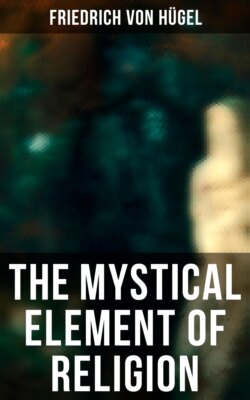Читать книгу The Mystical Element of Religion - Friedrich von Hügel - Страница 12
На сайте Литреса книга снята с продажи.
4. This mysterious law appears to obtain in precise proportion to the depth and importance of the truths and realities in view.
ОглавлениеAnd if we seem boxed up thus, each one away from our fellow, in all our really moving and determining inclinations and impressions, judgments and affections, with regard to matters on which we feel we can afford to differ deeply and to be much alone; we appear to be more and not less so, in exact proportion as the importance of the subject-matter increases. In moral and spiritual, in religious and fundamental matters, we thirst more, not less, for identity of conviction and of feeling; and we are, or seem to be, more, not less, profoundly and hopelessly at variance with each other than anywhere else.
And more than this: the apparent reason of this isolation seems but to aggravate the case, because here more than anywhere else imagination, feeling, intuition seem indeed to play a predominant, determining part; and yet here more than anywhere else we feel such a predominance to be fraught with every kind of danger. Thus here especially we feel as incapable of suppressing, indeed of doing without these forces, as of frankly accepting, studying, and cultivating them. Now and then we take alarm and are in a panic at any indication that these springs and concomitants of life are at work within us; yet we persist in doing little or nothing to find sufficient and appropriate food and scope and exercise for the right development and hence the real purification of these elemental forces, forces which we can stunt but cannot kill. Nothing, we most rightly feel, can be in greater or more subtle and dangerous opposition to manly morality or enlightened religion than the seeking after or revelling in emotion; nothing, we most correctly surmise, can equal the power of strong feeling or heated imagination to give a hiding-place to superstition, sensuality, dreamy self-complacent indolence, arrogant revolt and fanaticism; nothing, even where such things seem innocent, appears less apt than do these fierce and fitful, these wayward and fleeting feelings, these sublimities and exquisitenesses, to help on that sober and stable, consistent and persistent, laborious upbuilding of moral and religious character, work, and evidence which alone are wanted more and more. Indeed, what would seem better calculated than such emotion to strain the nerves, to inflame the imagination, to blunt common-sense and that salt of the earth, the saving sense of the ridiculous, to deaden the springs of research and critical observation, to bring us, under the incalculably sapping influences of physical abnormalities, close up to where sanity shades off into madness, and ethical elevation breaks down into morbidness and depravity?
